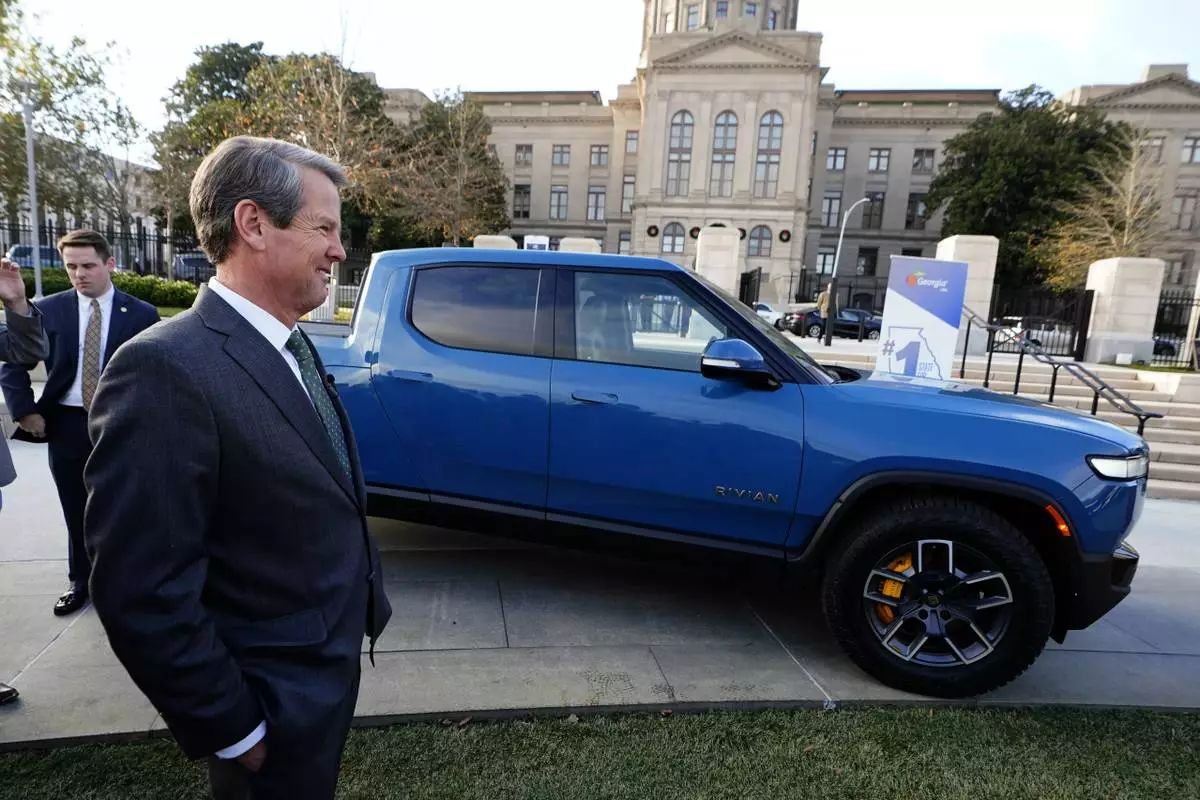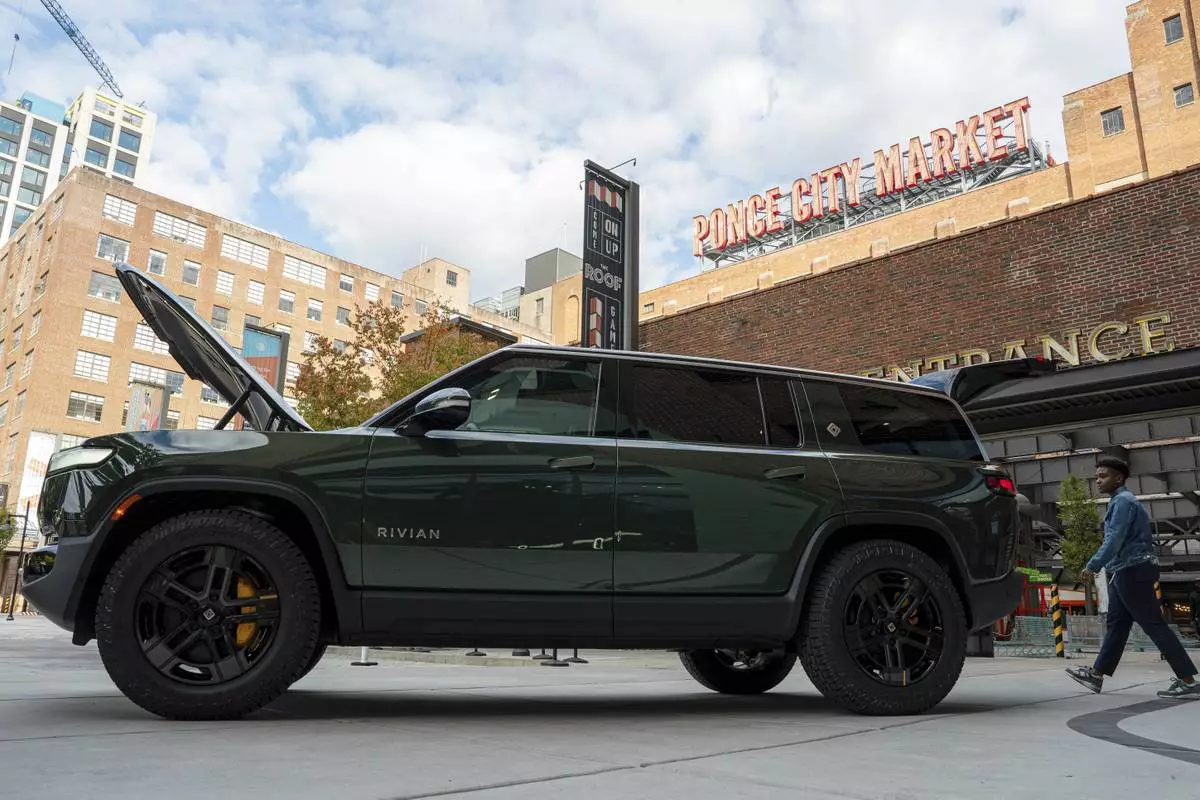WASHINGTON (AP) — Americans’ outlook on the economy improved modestly in November, lifted by expectations for lower inflation and more hiring.
The Conference Board, a business research group, said Tuesday that its consumer confidence index ticked up to 111.7 from 109.6 in October. The small increase followed a big gain in October.
Rising consumer confidence suggests Americans may spend more in the coming months, which would help boost economic growth. Yet Americans have been spending at a healthy clip for much of the past two years even as confidence measures have been low, a sign that sentiment surveys may not be as useful a guide to the economy's direction as they were in the past.
The uptick comes after President-elect Donald Trump's victory in the presidential election. The Conference Board doesn't break out its responses by party, but another measure of consumer sentiment by the University of Michigan showed that optimism about the economy jumped among Republicans after the election.
In the Conference Board's report, the proportion of Americans who anticipate a recession in the next 12 months fell to the lowest level since the group first began asking the question in July 2022. And consumers' optimism about future hiring rose to its highest level in nearly three years.
The survey found that Americans' expectations for future inflation fell to its lowest level since March 2020, nearly a year before consumer prices began rising quickly. When asked about their hopes for 2025, “consumers overwhelmingly selected higher prices as their top concern and lower prices as their top wish for the new year,” the Conference Board said.
The report comes just hours after President-elect Donald Trump said he would impose stiff 25% tariffs on all imports from Canada and Mexico, and an additional 10% on imports from China. Economists and some retailers warn that such duties, if enacted, would be inflationary.
“Households for now seem to have their heads in the sand about the potential uplifts to consumer prices from tariffs and deportations, or they think Trump wasn’t serious about his intentions during the campaign,” Samuel Tombs, chief U.S. economist at Pantheon Macroeconomics, wrote in a client note.

FILE - People walk past small businesses in Doylestown, Pa., Nov. 4, 2021. (AP Photo/Matt Rourke, File)
ATLANTA (AP) — President Joe Biden's administration announced Tuesday that the U.S. Department of Energy will make a $6.6 billion loan to Rivian Automotive to build a factory in Georgia that had stalled as the startup electric vehicle maker struggled to become profitable.
It's unclear whether the administration can complete the loan before Donald Trump becomes president again in less than two months, or whether the Trump administration might try to claw the money back.
Trump previously vowed to end federal electric vehicle tax credits, which are worth up to $7,500 for new zero-emission vehicles and $4,000 for used ones.
Rivian made a splash when it went public and began producing large electric R1 SUVs, pickup trucks and delivery vans at a former Mitsubishi factory in Normal, Illinois, in 2021. Months later, the California-based company announced it would build a second, larger, $5 billion plant about 40 miles (64 kilometers) east of Atlanta, near the town of Social Circle.
The R1 vehicles cost $70,000 or more. The company plans to produce R2 vehicles, a smaller SUV, in Georgia with lower price tags aimed at a mass market. The first phase of Rivian’s Georgia factory is projected to make 200,000 vehicles a year, with a second phase capable of another 200,000 a year. Eventually, the plant is projected to employ 7,500 workers.
But Rivian was unable to meet production and sales targets and rapidly burned through cash. In March, the company said it would pause construction of the Georgia plant. The company said it would begin assembling its R2 SUV in Illinois instead.
CEO RJ Scaringe said the move would allow Rivian to start selling the R2 sooner and save $2.25 billion in capital spending. Since then, German automaker Volkswagen AG said in June it would invest $5 billion in Rivian in a joint venture in which Rivian would share software and electrical technology with Volkswagen. The money eased Rivian's cash crunch.
Tuesday's announcement throws a lifeline to Rivian's grander plans. The company said its plans to make the R2 and the smaller R3 in Georgia are back on and that production will begin in 2028.
“This loan would enable Rivian to more aggressively scale our U.S. manufacturing footprint for our competitively priced R2 and R3 vehicles that emphasize both capability and affordability,” Scaringe said in a statement.
The Department of Energy said the loan would substantially boost electric vehicles made in the United States and support the Biden administration’s goal of having zero-emission vehicles make up half of all new U.S. sales by 2030.
“As one of a few American EV startups with light duty vehicles already on the road, Rivian’s Georgia facility will allow the company to reach production volumes that make its products more cost competitive and accelerate access to international markets,” the department said in a statement.
The loan includes $6 billion, plus $600 million in interest that will be rolled into the principal. The money would come from the Advanced Technology Vehicles Manufacturing Loan Program, which provides low-interest loans to make fuel-efficient vehicles and components. The program has focused mostly on loans to new battery factories for electric vehicles under Biden but earlier helped finance initial production of the Tesla Model S and Nissan Leaf, two pioneering electric vehicles.
The program, created in 2007, requires a "reasonable prospect of repayment" of the loan.
Democratic U.S. Sen. Jon Ossoff, who has been a vocal supporter of electric vehicle and solar manufacturing in Georgia, hailed Tuesday's announcement as “yet another historic federal investment in Georgia electric vehicle manufacturing.” Ossoff had asked Energy Secretary Jennifer Granholm to support the loan in July.
“Our federal manufacturing incentives are driving economic development across the state of Georgia,” Ossoff said in a statement.
Georgia Gov. Brian Kemp says his goal is to make Georgia a center of the electric vehicle industry. But the Republican has had a strained relationship with the Biden administration over its industrial policy, even as some studies have found Georgia has netted more electric vehicle investment than any other state.
Kemp has long claimed that manufacturers were picking Georgia before Biden's signature climate law, the Inflation Reduction Act, was passed.
Efforts to bring Rivian to Georgia predated the Biden administration and "our shared vision to bring opportunity to Georgia will remain no matter who resides in the White House or what party controls Congress,” Kemp spokesperson Garrison Douglas said Tuesday.
The loan to Rivian could rescue one of the Kemp administration's signature economic development projects even as Biden leaves office. That could put Rivian and Kemp in the position of defending the loan if Trump tries to quash it.
State and local governments offered Rivian an incentive package worth an estimated $1.5 billion in 2022. Neighbors opposed to development of the Georgia site mounted legal challenges.
State and local governments spent around $125 million to buy and prepare the nearly 2,000-acre (810-hectare) site. The state also has completed most of $50 million in roadwork that it pledged.
The pause at Rivian contrasts with rapid construction at Hyundai Motor Group’s $7.6 billion electric vehicle and battery complex near Savannah. The Korean automaker said in October that it has begun production in Ellabell, where it plans to eventually employ 8,500.

FILE - Gov. Brian Kemp smiles as he stands next to a Rivian electric truck during a ceremony to announce that the electric truck maker plans to build a $5 billion battery and assembly plant east of Atlanta projected to employ 7,500 workers, Dec. 16, 2021, in Atlanta. (AP Photo/John Bazemore, File)

FILE - A locked gate on a closed road near the site of a planned Rivian electric truck plant is shown March 7, 2024, in Rutledge, Ga. (AP Photo/John Bazemore, File)

FILE - A truck leaves the site of a planned Rivian electric truck plant March 7, 2024, in Rutledge, Ga. (AP Photo/John Bazemore, File)

FILE - A Rivian R1S is displayed outside of the auto manufacturer's new space at Ponce City Market on Oct. 19, 2023, in Atlanta. (Matthew Pearson/WABE via AP, File)














